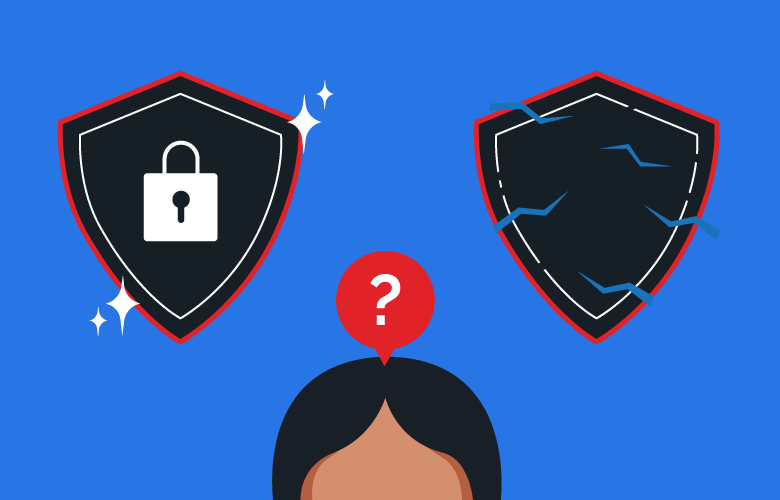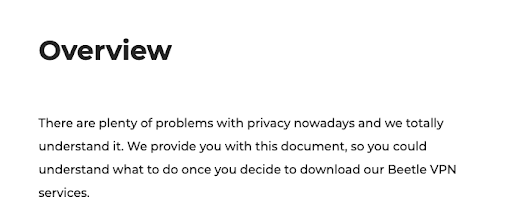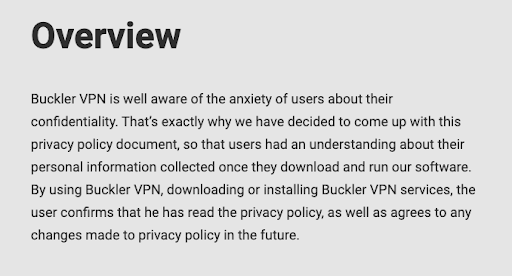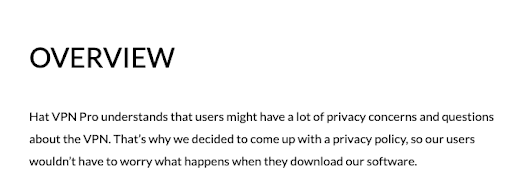October 21, 2021
VPN Protocols: A Complete Guide for 2025
The average VPN has at least a couple of VPN protocols on offer, but what’s the difference [...]

WHAT’S IN THIS REVIEW?
Disclaimer: Partnerships & affiliate links help us create better content. Learn how.
Free VPNs are supposed to be “free” insofar as the service is accessible without cost or payment. That might be true in a direct, monetary sense, but there are other ways in which they aim to extract value from their users. The vast majority of free VPNs come up short in some respect, whether it be due to issues surrounding personal data, or poor performance compared to premium VPN services.
Here’s everything you can expect from free VPN providers, and why it’s better to stick with freemium versions at the very least.
What’s wrong with using a free service, and is there any real difference aside from a few limitations in terms of servers and speeds? A bit of a loaded question, but we’ll try to provide some perspective.
It’s advisable to be especially wary with any free VPN provider, and the same goes for many premium options that seem too good to be true. After all, as the adage goes, if the product is free – you are the product. This may come in the form of an uptick in spam if you’ve handed over an email address or in more nefarious purposes such as stealing passwords or injecting malware. But more on that later.
Plainly, VPNs need significant hardware to operate, and that’s without accounting for basic business expenses such as staff wages or rent. They’re costly to run and maintain, and many aim to recoup their outlay at the expense of the user in some shape or form. Consider the primary purpose of a VPN.
A VPN provides privacy by creating a private network to keep your data safe, and it should help the user to remain anonymous online while doing so. But can a free VPN work to the same ability as a service that is directly paid for by users? Possibly, but it’ll be an expensive endeavor.
It’s also unlikely that this hypothetical altruistic company exists; at the very least I haven’t come across one while using and reviewing VPNs personally. Even the best free providers are pale imitations of the real thing, lacking in meaningful features when measured up against a full-fat version.
Above all, you’ll have to trust a free service with your personal data, which is especially daunting if you can’t see how the VPN makes money in the first place.

User data is valuable. Often in ways you wouldn’t necessarily expect. For example, Google doesn’t sell the reams of personal data they collect. Instead, they charge clients to target their users with advertising, with a recent shift to a system called Federated Learning of Cohorts (FLoC).
Google apparently aims to add a thin layer of privacy by serving targeted ads to groups of people with “common interests”, rather than individuals. Either way, they’re still scooping up as much of your data as possible, and they wouldn’t hand it over to anyone since it forms a core part of their business model.
At worst, a free VPN will log any and all data collected while the app is in use. (Consider Cambridge Analytica, and how they used a harmless-looking Facebook quiz to harvest an estimated 87 million user profiles.)
An analysis of 283 Android VPNs found that “over 38% of them contain some malware presence”, while “only a marginal number of VPN users have publicly raised any security and privacy concerns in their app reviews.” Over 75% of the apps they tested used third-party tracking, and 18% used no encryption. In other words, many fail to provide the most basic levels of protection and are purely developed as a front to scoop up data or siphon money from the user.
This isn’t always the case, as it doesn’t have to be a malicious breach. It can also happen due to negligence, or poor security protocols. It can also happen to both desktop or mobile users, on any and every platform.
The news that Android-based providers SuperVPN, GeckoVPN, and ChatVPN were compromised broke early in 2021 when 21 million user records were put up for sale on a popular hacker forum.
The data included:
Similar stories exist for many “free” providers, so there’s a chance that you could end up being compromised in an attempt to save a few bucks.
Most free VPN providers are actually freemium in practice, offering a lighter version of their paid service. Windscribe is the perfect example of this business model, offering 10 GB of data per month as long as you sign up with a verified email address.
It’s not an inconsiderable amount of data and should be enough for minimal use over the 30-day period. However, they’re hoping that it’ll act as a prompt to switch over to the premium version, which has a larger selection of servers, along with more benefits, device connections, and features. This is perfectly fair, and we’d trust the freemium version as much as the premium edition when it comes to the majority of well-known providers.
Regardless, you should still be wary of premium VPNs, even if all appears well on the surface. For example, Windscribe recently had servers seized in Ukraine, which were later found not to be encrypted whatsoever. It’s devastating news. However, it’s worth mentioning that they were open and honest about the flaws that were uncovered.
The risk is even higher if you’re looking at purely free services or budget options that don’t seem to have any additional security features on display. Free providers are some of the worst culprits, and unlike Windscribe, they’re unlikely to own up to any issues until they make the news.
The freemium tier is an unhappy medium, but it’s better to take advantage of free trials rather than entrusting a free VPN with your personal data.
Atlas VPN recently released a report using Identity Theft Resource Center (ITRC) data, outlining personal data breaches for the first half of 2021. The report found that “personal data compromises are up 38% in Q2 over Q1 2021. Healthcare and financial services remain one of the most targeted sectors by hackers as they can benefit from stolen data or a paid ransom.”
If your budget requires the use of a free VPN, we recommend checking out these top free providers over any other solution out there – tested and reviewed by yours truly.
Free VPNs are always going to struggle in comparison to the latest and greatest premium options. That’s to be expected, but are there many benefits aside from the lack of a monthly fee? Consider the notable benefits of a free VPN versus a Premium VPN:
If you’re not paying via traditional means, it’s likely they’re recouping costs in ways you may not have considered. If that’s just in the form of ads on the platform, that’s fair enough, but there are various red flags to be aware of before signing up for a free VPN. Take the time to check for any data leaks, which often defeat the purpose of using a VPN in the first place. A simple place to start is to check your IP address to make sure that it’s being masked correctly.
Remember, “free” tends to come at a cost, even if it isn’t apparent at first glance.

With hundreds of options to choose from, it’s going to be tough to find a free provider that actually has your back. The ideal free VPN won’t sell your personal data, and won’t be too pushy in terms of their premium service. Here are a few things to look for:
Speeds are always going to be a problem due to the nature of unpaid servers. Anyone and everyone can connect to a server at any given time, while others are usually reserved for paying customers. With that being said, some will still be faster than others, even if they won’t match the likes of NordVPN or ExpressVPN.
Free VPNs that impressed us during testing include Hola VPN and ProtonVPN. While their free plans come with limited connections and server options, we were still able to connect to a nearby US server that performed at above-average speeds making these options for a fast free VPN.
You’ll also have fewer servers to choose from with a free VPN, and some providers have coverage in different areas. Once again, it’s a problem that can be solved with the use of a premium provider. Typically, you can expect to see a US server available to connect to, and chances are you can still skirt around any ISP attempting to throttle your speeds if you choose your free VPN carefully.
Avoid any service that makes unreasonable promises, and it’s wise to forget about unblocking streaming services like Netflix with any sort of regularity. It’s often unreliable and glitchy with heavy usage activities like this. Additionally, free VPNs that claim to have servers “optimized” for streaming or torrenting may not live up to the hype – or performance expectations.
Check out the VPN’s privacy policy as it should give you a better idea of what to expect. Legally, this policy should be the true source of answers to your privacy questions. A detailed, transparent privacy policy is ideal and shows just how serious a VPN is about protecting your data.
We hinted at a few free VPNs worth trying out if you’re set on using a free or freemium provider. Overall, these are the Best Free VPNs in 2025 we’ve tested and reviewed:
Let’s take a look at the top and bottom options of the five free VPNs we recommend: Hola VPN and ProtonVPN.
With a freemium VPN service, we see Hola as the gateway VPN for future premium users. Hola VPN is very easy to set up and has a modern UI compared to some other legacy brands. You can find its full compatibility list below, which is far better than most free options out there.

Hola offers users more than 1,000 worldwide servers on a P2P proxy network, which allows for faster speeds and unblocking ability for things like streaming and torrenting. All in all, Hola VPN’s free service is primarily to overcome censorship and help users stream shows. For airtight security and trusted privacy, you’d undoubtedly have to upgrade to its premium tier. At $2.99 per month on its longer plan, it’s a cheap VPN.
ProtonVPN also has a decent free tier that ticks many of the boxes mentioned above. It allows for one VPN connection, as well as connecting to servers in three countries. These are located in the US, Japan, and the Netherlands. Speeds are decent, while they’re happy to ensure that no logs are kept, even if they aren’t collecting payment. Above all, it’s one of the better free offerings you’ll find, and it’s a great way to introduce yourself to their service.
However, the full-fat version has over 1,200 servers in 55 countries, streaming service support, faster speeds, and allows for up to 10 simultaneous connections. Once again, they’re hoping you’ll upgrade eventually after seeing what ProtonVPN has to offer with the free tier.
No matter if you go with the number one ranked VPN or our closing option, these five VPNs at least follow through on the claims they make. Whether for streaming, privacy, or both, you get what you sign-up for.
Mobile users should be especially careful in regards to using a free VPN. There are endless dodgy VPN services on both the Android and iOS stores, so be sure to take a look at the permissions and payment page first.
In March 2021, researchers at Avast “discovered a total of 204 fleeceware applications with over a billion downloads and over $400 million in revenue on the Apple App Store and Google Play Store. The purpose of these applications is to draw users into a free trial to “test” the app, after which they overcharge them through subscriptions that sometimes run as high as $3,432 per year.”
Fleeceware refers to apps that have no additional purpose or function aside from “fleecing” the unsuspecting customer with excessive in-app subscription fees. Beetle VPN, Buckler VPN, and Hat VPN Pro were three fleeceware iOS apps named in a 2020 expose. In terms of what they all had in common, their privacy policies were laughable and somewhat similar in tone.
BeetleVPN Policy (via Web Archive):



At the very least, you should expect to encounter some legalese, while a good privacy policy will notify the user of any data the VPN does collect. (Ideally, the perfect answer is “no data whatsoever”.)
Secondly, the trio of fleeceware iOS apps had high ratings ranging from 4.6 to 4.8, and numerous similarly worded positive reviews. Again, this is a major tell-tale sign if you think an app might be gaming the system to trick customers. (The positive reviews tended to be short, using a few words.) Also, take a look at whether the developer responds to one-star reviews and the reasons given as to why users were unhappy. It should start to build up a picture in terms of whether the service can be trusted or not.
Furthermore, they may ask for payment information, despite offering a three to seven-day trial to entice users. If you’re going to go down that route regardless, we’d advise taking advantage of one of the many 30-day money-back guarantees offered by more trustworthy VPNs.
NordVPN is our top-rated service, while Surfshark is great if you’re on the market for an affordable option that won’t hurt the bank. Check them out for yourself:
Q. Can “free” VPNs be trusted?
A. No.
Q. Then, can “freemium” VPNs be trusted?
A. It depends.
It would be irresponsible of me to recommend the use of any VPN that doesn’t appear to charge the user – or at the very least have those premium features and network in place. At best, a free VPN will be underpowered, with a likelihood that it could be scooping up your personal data on the side.
As always, we’d stick with an audited provider that is able to back up any logging claims. Also, the difference in speed will be noticeable straight away if you’ve only used a free VPN in the past. That’s without accounting for servers, access to streaming sites, and true online privacy.
Sometimes in life, you really do get what you pay for – or don’t pay for in this case.
Since VPNs are there to protect your data and provide anonymity, it doesn’t make sense to skimp when there are plenty of great cheap VPNs for users on a tight budget. Time and again, dodgy companies have used “free” to trick unsuspecting users, and it’s not worth the headache of getting rid of malware or dealing with a vastly inferior service. Not to mention, there are the many fleeceware apps that can end up costing unsuspecting users thousands of dollars in the long run.
Surfshark is our top pick for users on a budget, coming in at $2.49 per month if you commit to a 24-month subscription. If you’re desperate to use a solid VPN, they also guarantee the right to claim a refund within 30 days of purchasing a subscription.
VPNs are cheaper than they used to be, but nothing beats free. The only problem is, you’re sure to be paying in some form or another.
| Cookie | Duration | Description |
|---|---|---|
| __cfduid | 1 month | The cookie is used by cdn services like CloudFlare to identify individual clients behind a shared IP address and apply security settings on a per-client basis. It does not correspond to any user ID in the web application and does not store any personally identifiable information. |
| cookielawinfo-checkbox-advertisement | 1 year | The cookie is set by GDPR cookie consent to record the user consent for the cookies in the category "Advertisement". |
| cookielawinfo-checkbox-analytics | 1 year | This cookies is set by GDPR Cookie Consent WordPress Plugin. The cookie is used to remember the user consent for the cookies under the category "Analytics". |
| cookielawinfo-checkbox-necessary | 1 year | This cookie is set by GDPR Cookie Consent plugin. The cookies is used to store the user consent for the cookies in the category "Necessary". |
| cookielawinfo-checkbox-non-necessary | 1 year | This cookie is set by GDPR Cookie Consent plugin. The cookies is used to store the user consent for the cookies in the category "Non-necessary". |
| cookielawinfo-checkbox-performance | 1 year | This cookie is set by GDPR Cookie Consent plugin. The cookie is used to store the user consent for the cookies in the category "Performance". |
| viewed_cookie_policy | 1 year | The cookie is set by the GDPR Cookie Consent plugin and is used to store whether or not user has consented to the use of cookies. It does not store any personal data. |
| Cookie | Duration | Description |
|---|---|---|
| cookielawinfo-checkbox-functional | 1 year | The cookie is set by GDPR cookie consent to record the user consent for the cookies in the category "Functional". |
| cookielawinfo-checkbox-others | 1 year | No description |